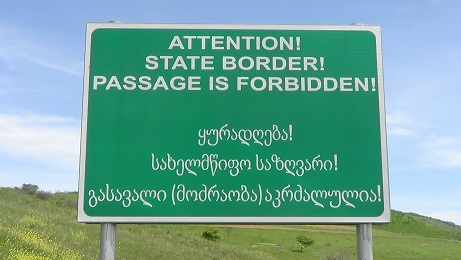Lado Bitchashvili, Shida Kartli
The difficult heritage from 2008 Russia-Georgian armed conflict is still issue of concern 10 years after the war. Thousands internally displaced people and occupied territories – nothing has changed. The only thing that is changing is the creeping occupation line and moving fences, which became daily routine for the locals together with the difficult heritage.
The banners indicating at the border with the so-called South Ossetian Republic are set up in several places in Bershueti village, Gori municipality. The people still take care of the places of worships nearby the occupation line and in the occupied territory too. Most frequently, the locals violate the regulations of the occupant regime during religious holidays, when they go to the places of worship in the occupied territory; however, there were occasions when Russian soldiers arrested the parishioners, take them to Tskhinvali detention setting and judge for the illegal crossing of the so-called border and then release them after paying the fine.
There is a demarcation line between Bershueti and Tsinagara villages, which is tillage. As a local told us, the Russian military base was constructed on the playground where residents of Bershueti village and ethnic Ossetian inhabitants of Tsinagara village plaid friendship match before the 2008 war.
The locals told these stories to Aage Borchgrevink, senior advisor of the Norwegian Helsinki Committee, who was studying the situation in the conflict affected region 10 years after the 2008 war and visited the villages alongside the occupation line.
“I want to know how people live in this village and how the so-called “border” is moving, which causes at least two problems: first – it is clear how people are losing agricultural plots and the second – it is not clear where the so-called border is and it results into frequent arrest and kidnapping of people, who are taken to Tskhinvali pre-trial detention setting and are released after paying the fee. I was here in 2008 and safety problems are still urgent here. We met people who complain about this problem; the security issue has been normalized here and it is not good at all,” Borchgrevink said, who arrived in Georgia in 2008 several days after the war and documented the results of the Russian intervention and interviewed victimized population.
Representatives of Human Rights Center accompanied Aage Borchgrevink in the villages on ABL, who provided him with the detailed information about the security issues of locals.
HRC representative Ucha Nanuashvili, who was Public Defender of Georgia in 2012-2017, said that residents of the conflict-affected villages have social problems too, that became reason of intensive migration from the ABL villages.
“Problems continue; people, together with the security issue, have to cope with social-economic problems. Lack of drinking and irrigation water compels people to leave villages. Many families left homes, it is a huge problem and the government shall pay attention to this process,” HRC representative Ucha Nanuashvili said.
Humanrights.ge inquired whether the government had fulfilled the recommendations, which the former Public Defender had with regard to occupation territories and the people living in adjacent areas.
“There are issues which were taken into consideration by the authority; however, I think the recommendations were partly fulfilled. Social-economic conditions changed in some villages but the problems still prevail in most settlement areas,” Ucha Nanuashvili said.
He added that existing hard social conditions are farther aggravated with kidnapping of people from the villages alongside the occupation line. Although he, as a public defender, and international organizations too, many times raised this issue in the reports, the facts of kidnapping still happen and the situation is really very alarming.
News
December 13, 2023
Ethnic minorities outside the peace dialogue
November 6, 2023
‘Peace’ agenda of political parties
Popular
Articles
February 13, 2024




